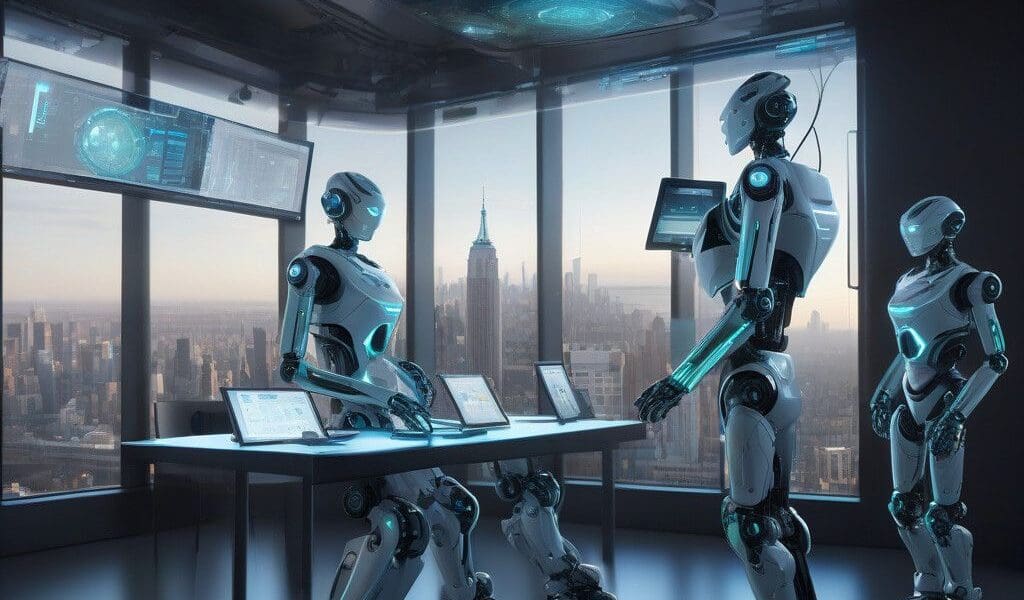Bezos and OpenAI Back New Robot Software: Transforming the Future of Robotics
In a significant development within the robotics sector, Physical Intelligence, an innovative AI startup, has successfully raised $400 million in funding, drawing attention from prominent investors including Jeff Bezos and OpenAI. This investment not only highlights the growing interest in AI-driven robotics but also positions Physical Intelligence with a valuation of $2 billion.
Physical Intelligence’s mission is ambitious yet clear: to create foundational software that can be used across various types of robots, eliminating the often expensive and time-consuming need for custom programming tailored to specific tasks. The company’s vision reflects a broader trend within the technology sector, where efficiency and adaptability are paramount.
The influx of capital into AI and robotics aligns with predictions that the global technology landscape is on the verge of transformation. Major players such as Microsoft, Google, Meta, Amazon, and Nvidia are investing heavily in AI, with projections from venture capital firm Accel suggesting that combined funding for AI and cloud technology could reach an astonishing $79.2 billion in the US, Europe, and Israel by the end of 2024. Such substantial investments catalyze advancements in technology, particularly in robotics.
As competition in the robotic AI space intensifies, startups like Vicarious, Universal Robots, and Covariant are also pushing boundaries, indicating that the landscape is ripe for innovation. Elon Musk, a central figure in this dialogue, has forecasted that by 2040, around 10 billion humanoid robots will be in circulation, priced between $20,000 and $25,000. This prediction underscores the growing market for AI-powered robots and they increasingly penetrate everyday life.
Physical Intelligence is already demonstrating the capabilities of its groundbreaking software platform, π0 (or pi-zero). This software showcases impressive versatility, enabling robots to perform complex tasks such as folding laundry, bagging groceries, and retrieving toast from a toaster. Such functionalities not only promise to simplify domestic chores but also revolutionize operational efficiencies in sectors like logistics and automation.
The implications of this innovation stretch far beyond convenience at home. By enabling robots to take on a wide range of tasks, Physical Intelligence positions itself as a potential game-changer in various industries. For example, in warehouses, robots could streamline inventory management and order fulfillment processes, reducing errors and boosting productivity. This shift toward robotic automation reflects a growing acknowledgment of robotics as an essential element for operational success in an increasingly competitive marketplace.
Moreover, the investment from high-profile backers such as Bezos and OpenAI adds considerable weight to Physical Intelligence’s credibility. Bezos, who has a proven track record of enhancing efficiency through technology in his own ventures, brings a wealth of experience in scaling businesses and understanding market needs. OpenAI, known for its leading role in advancing artificial intelligence, ensures that the startup aligns with cutting-edge technologies and research.
As we look to the future, the partnership between tech titans and innovative startups exemplifies a critical trend in the economy: the convergence of traditional business practices with advanced technology. This synergy not only fosters innovation but also invites greater scrutiny of ethical considerations surrounding the use of AI and robotics.
Increased automation raises questions about labor displacement and the future of work. As robots become capable of performing tasks that traditionally required human labor, a dialogue around reskilling and adapting the workforce becomes essential. Companies must consider not only the technology itself but also the societal implications of automation.
Physical Intelligence’s journey is just the beginning of a broader movement that is likely to reshape various facets of daily life—both personally and professionally. As businesses and consumers alike begin to recognize the transformative power of robotics, we can expect a landscape where technology enhances human capability rather than replaces it.
In conclusion, the backing of Physical Intelligence by key industry players like Bezos and OpenAI signifies a robust endorsement for the robot software project and highlights a promising future for AI-driven robotics. As advancements continue at this pace, we stand at the brink of a technological revolution that could redefine multiple sectores, from home automation to critical industries across the globe.








